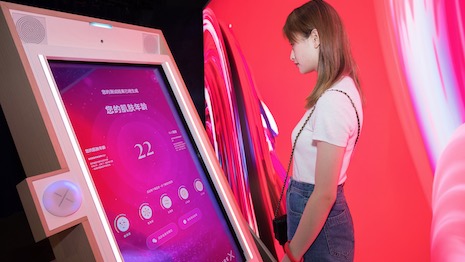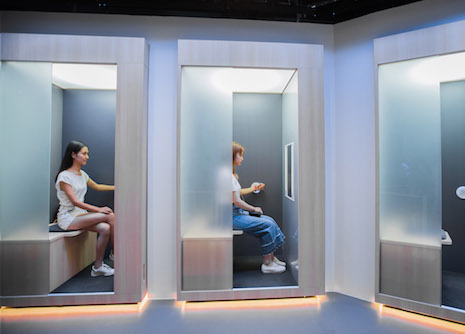 Beauty is getting a high-tech touch. Image courtesy of SK-II
Beauty is getting a high-tech touch. Image courtesy of SK-II
Beauty retail and marketing are undergoing a technology revolution, and exhibitors at the Consumer Electronics Show are showcasing their vision for the future of cosmetic engagement.
From augmented reality to artificial intelligence, beauty brands are finding ways to personalize the experience for shoppers and guide them through to a purchase, whether in-store or online. At CES this week, companies including SK-II, Coty and Perfect Corp. are rolling out innovations designed to make choosing skincare, makeup and hair color easier through trials and individualized analysis.
"It has been proven time and again that the more products a beauty consumer tries, the more she buys," said Alice Chang, founder and CEO of Perfect Corp. "Advanced AI and AR technologies allow shoppers to accurately and quickly test more products than ever possible with a physical try-on.
"While consumer might only swatch or test a handful of shades with a physical makeup tester, AI and AR technology significantly increases engagement, allowing them to try on dozens of shades in seconds," she said.
Facing forward
SK-II is showcasing its Future X Smart Store at CES. The concept, which originally debuted in Tokyo and has since expanded to Shanghai and Singapore, aims to offer consumers a “phygital” experience.
By sitting in a booth, shoppers are able to get an individual skincare consultation through facial recognition-powered diagnostics. Unlike many other skincare analysis solutions, consumers do not need their face to have direct contact with a device to get a reading.
SK-II's scan stations. Image courtesy of SK-II
After learning more about their skin type, consumers can head to a Smart Beauty Bar to discover products and make purchases through a digital shopping cart. Rather than tapping screens, the experience tracks shoppers’ hand movements to enable them to virtually add items to their basket.
Shopping for beauty in-stores can sometimes be an intimidating and overwhelming process. SK-II’s concept aims to address this by empowering shoppers with more independence and control at retail.
Beyond the Future X Smart Store, SK-II is bringing technology into consumers’ homes. The brand’s Facial Treatment Essence has been advanced with the Internet of Things, allowing consumers to use an application to help them create a more optimized skincare routine.
AI and AR are also playing a role in Perfect Corp.’s Beauty 3.0 solution tied to its YouCam apps. Similarly to how SK-II is leveraging diagnosis to drive skincare sales, the company is looking toward digital product trials to spur purchases.
Perfect Corp. has powered experiences for brands including Hearst’s Cosmopolitan magazine and beauty retailer Ulta.
At Ulta, the in-store salon allows consumers to virtually try on a hair dye before committing to a color change.
Meanwhile, Cosmopolitan has used the application to make its content more interactive, allowing readers to try out looks seen in the pages of an issue.
"Beauty 3.0 is shifting retail experiences from reactive, to proactive," Ms. Chang said. "Smart beauty technology is diving deeper into a personalized, custom shopping experience that generates results catered to the specific beauty shopper.
"This custom, catered and convenient shopping experience is what the beauty consumer is craving," she said. "Machine learning and AI/AR capabilities enable accurate personalized product recommendations based on user preferences to instantly deliver exactly this."
Similarly to Ulta, Coty’s Wella Professionals brand is rolling out a smart mirror at CES that uses AR to preview hair color makeovers. In addition to a live AR depiction of what the client can expect, the mirror can capture 360-degree views of the end result, creating an easier process than the typical two-mirror tactic employed by stylists.
Developed with CareOS, the solution can also pull up past photos of a client using facial recognition, which Wella expects will boost personalization at appointments.
Wella's smart mirror uses CareOS
Beauty is also getting into wearables.
L’Oreal’s technology incubator worked with the group’s skincare brand La Roche Posay to develop a wearable device that can measure the skin’s pH levels. My Skin Track pH communicates with a companion smartphone app to provide consumers with customized skincare regimens based on their pH.
Personalization is also coming to face masks, as seen in another CES debut. Neutrogena is leveraging 3D image software that is built into the latest iPhones to allow consumers to easily get a customized, 3D-printed mask that fits the contours of their face.
In addition to offering a personalized fit, the mask production will leverage skin analysis to target products and formulas to specific areas of a consumer's face.
Beauty behavior
The global beauty market is growing and is on pace to reach a value of more than $800 billion in the next five years, propelled by consumers' appetites for innovative skincare and fun, new products.
Younger consumers, those between ages 18 and 24, are one of the driving forces behind the beauty market's growth, according to Fashionbi's new "Beauty Market Trend" report. Celebrity brands, natural beauty, personalization and gender-bending products are also becoming more popular among beauty buyers (see story).
While a significant portion of the customer journey in the beauty category has migrated to digital channels, the bricks-and-mortar environment remains key for both exploration and conversion, with 65 percent of discovery happening in store.
According to a survey conducted by Accenture for Facebook, younger shoppers between the ages of 18 and 34 are the most apt to have found a new beauty product online, with almost half of these respondents saying they have discovered makeup via mobile. As beauty brands seek to make it easier for consumers to try out and find cosmetics and skincare virtually, an approach that blends channels allows marketers to reach shoppers across their purchase path (see story).
"Advanced facial mapping and detection have made beauty trials one of the most true-to-life virtual experiences," Ms. Chang said. "The rainbows of colors and vast assortment of products available in this category also lend themselves to a quick-try solution that encourages trial and experimentation.
"Given the accuracy of facial recognition, AI, and AR technologies and the excitement surrounding beauty discovery on the whole, this type of smart beauty tech innovation serves a functional and fun purpose among brands, retailers and consumers alike," she said.

